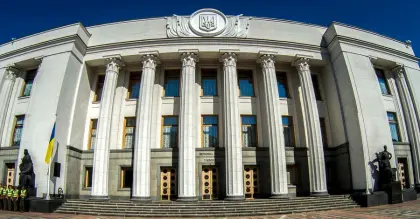For several weeks, there has been heated discussion on social networks about the possibility that Ukrainians liable for military service would be allowed to go abroad during martial law if they provide guaranteed financial support of the Armed Forces of Ukraine.
The notion is contained in draft law № 8029, that was authored by a member of the Servant of the People party, Heorhiy Mazurashu and registered by the Verkhovna Rada on Sept. 13, 2022.
JOIN US ON TELEGRAM
Follow our coverage of the war on the @Kyivpost_official.
Kyiv Post tried to find out why the document has been actively discussed for more than a year, what chance it has of being adopted and whether the bill is “constitutionally sound.”
What does Mazurashu's draft law propose?
The draft law proposes changes to the current laws limiting the rights of Ukrainians liable for military service from leaving or entering the country. The proposed law would allow those of military age to go abroad during martial law, subject to a number of conditions.
The individual would be required to lodge Hr. 13,420 ($370) in an account with Ukraine’s state bank which cannot be accessed abroad.
Then he/she must make a written, notarized commitment to replenish the account with funds equivalent to the 18 percent tax rate on the minimum salary, plus 1 war tax of 1.5 percent, plus 22 percent of social security tax. Currently, the minimum monthly wage in Ukraine is Hr. 6,700 ($185), making the taxed sum Hr. 2,780 ($77). This sum would be recovered from the lodged account, to support the Armed Forces, for each month the individual is abroad.

Adding Fuel to the Fire
Citizens who go abroad under the scheme would have to provide additional confirmation that they had met these conditions upon returning to Ukraine. The bill does not detail which confirmations must be provided.
Ukrainians liable for military service who went abroad during martial law outside the conditions proposed in the draft law № 8029 and who do not hold documents postponing their conscription liability will also have to donate to the Armed Forces when entering the country.
For each month of absence from Ukraine these individuals will be required to pay a sum, calculated at 10 times the established subsistence rate for able-bodied citizens on the day of return, to the special account created to collect funds for the support to the Armed Forces. Currently this would “cost” Hr. 26,840 ($740) payable for each month of the stay abroad.
Parliamentarians say the draft law has no chance of passing
Although the document was submitted to parliament more than a year ago, it really only earned public attention in late October of this year. Numerous articles appeared in the mass media with the headlines asking “when will the law enter into force?” Lawyers began actively commenting on the document, and social networks began to debate when Verkhovna Rada would consider the draft law.
The parliament's website, shows that the bill was included in the agenda for Sept. 5 this year and says it is currently being worked on in committee.
Kyiv Post reached out for comment to the Committee on Foreign Affairs and Interparliamentary Cooperation, which was identified as being responsible for processing the document. However, the chairman of the committee, Oleksandr Merezhko said he “had not heard anything about such a draft law.”
"Our committee definitely doesn't have it," the MP noted.
At the same time, the website of the parliament states that the draft law was submitted to the committee for review on Sept. 15, 2022.
A Kyiv Post source from the Servant of the People party emphasized that it was anonymous Telegram channels that began spreading information about Mazurashu's draft law.
“This is always alarming... We should ask the Center for Strategic Communication to investigate where the trigger came from. I have a feeling that this may be part of a Russian campaign so that everyone looks at each other [wondering whether] one can leave the country paying money, while the other not,” says the interlocutor who is adamant that this bill has no chance of being passed.
“It's a big mystery to me why everyone is writing about draft law № 8029, which was registered more than a year ago, which is not moving anywhere and will not move. Look at how many bills authored by Mazurashu were adopted by the Verkhovna Rada. I can tell you - zero. This draft law has no chance of getting the approval of the committee, nor of being voted for, like the rest of Mazurashu's creative ideas.”
The Parliamentary Committee on Social Policy and Protection of Veterans' Rights recommended that parliament reject the draft law.
“The Administration of the State Border Guard Service, the Ministry of Defense of Ukraine, the Ukrainian Parliament Commissioner for Human Rights, the National Police of Ukraine, the Security Service of Ukraine do not support the bill and point out that its provisions contradict the provisions of the Constitution of Ukraine,” the committee concluded.
Does draft law № 8029 violate the Constitution?
The Parliamentary Committee on Human Rights points out in its conclusions that the provisions of the draft law on donations to the Armed Forces for those intending to go abroad not under the conditions provided for in the draft law and who do not have the right to a deferment of conscription violate two articles of the Constitution.
In particular, they violate Article 33 of the Constitution, according to which “a citizen of Ukraine cannot be deprived of the right to return to Ukraine at any time” and the provisions of Part 3 of Article 22 of the Constitution saying “when adopting new laws or making changes to existing laws, it is forbidden to narrow the content and scope of existing rights and freedoms”.
An expert in Constitutional Law, Sergiy Panasyuk, commented to Kyiv Post that refusing a citizen’s right of entry into Ukraine was not specified in the draft law.
He said “The document does not and cannot prohibit the entry of a citizen into the country. It is not clear where the committee read this. However, the provisions on donations are debatable and may be distorted in law enforcement... The most important thing is how this law will be enforced. These norms of the law cannot be extended to persons who left before the law came into force.”
The lawyer emphasizes that Part 1 of Article 58 of the Constitution establishes that laws and other normative legal acts cannot be retroactive, except when they mitigate or cancel the responsibility of a person.
“The law can be interpreted incorrectly. It can be considered that it applies to everyone from the moment martial law is introduced, and not from the moment this law comes into effect. However, it is not possible to spread the effect of the law before it enters into force, only if it does not soften legal relations,” the expert says.
Panasyuk points out that there is a great risk of discrepancies in interpretations of this law, although draft law № 8029 does not contain the wording “from the moment of the introduction of martial law,” but rather “during the period of martial law.
“If someone from the authorities starts saying that you left two or three months ago, or in 2022, and therefore pay, then these will be illegal, unconstitutional actions,” is the lawyer’s assessment.
You can also highlight the text and press Ctrl + Enter






